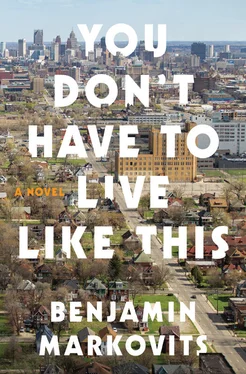“I was hungry.”
“So go get something to eat.”
“You don’t understand, I’m like on some watch list. I get one more absence, they give me detention and I got to come after school.”
“You should have thought of that before.”
“I didn’t know we had no sub today with a stick up his ass.”
“Well, now you know.”
“Man, fuck this. This is unreasonable. No way I’m going to detention for this. I’ll tell you what happen next. They put me on suspension for not going to detention. Then I’ll drop out of school and be like one of them corner kids because of you. And all because you wouldn’t open this damn door.”
I let him in.
By lunchtime I felt like I was coming down with flu — physically sore and stiff. My head ached, the institutional-strength classroom lights hurt my eyes. I looked out for Gloria in the cafeteria and sat down at her table but not near enough to talk. After lunch, when she got up to bus her tray, I bused mine, too, and said, “Can I talk to you?”
“What about?”
“I just need a friendly voice.”
“You can walk with me, I got class.”
She seemed short with me, officially polite, and I wondered if somehow I had annoyed her. But the truth is, she was probably being friendly enough. I didn’t know her well at all. Every time I taught at Kettridge I looked out for her in the lunchroom, and we found things to talk about or joined in the general conversation, and once I waited around after school by my car when I noticed it was parked close to hers. It was a Friday afternoon, the week before Thanksgiving, and a high-pressure front had cleared out the clouds. The big highway street lamps overlooking I-94 were already lit, and the sky had the almost white blue color of a late winter afternoon. It was cold, too; the metal of the car door felt chilly on my butt as I leaned against it.
“You waiting for somebody?” Gloria said, shifting the bag on her hip to look for her keys.
“I thought maybe we could go for a drink. It’s Friday night.”
“Most Friday nights I have a bath and go to bed. Saturday night’s going-out night.”
“How about tomorrow then?” But I remembered I couldn’t. Astrid and I had a date. “Actually I can’t tomorrow, let’s just have a beer tonight.”
It was rush hour, and the noise of the freeway gave a funny urgency to the conversation and made everything seem somehow temporary and important. The world outside was the world of traffic and commutes and stretched from here to Ann Arbor and Brighton and Auburn Hills, on 96 and 94 and 75 and 696.
“I told you I’m tired. I get cranky when I’m tired. If you want to ask me out just ask me out.”
“I thought that’s what I was doing.”
“I don’t know what you’re doing. If you want to go out with a girl you don’t have to start teaching at her school.”
“But I wanted to do that, too. I’m not exactly overemployed at the moment.”
“That’s all this is. You don’t know what to do with yourself. I can’t even tell if you like me very much. All you ever do at lunch is try to argue with me.”
“I argue with everybody.”
“That’s just what I mean. Listen, I told you I’m cranky. You got my number, if you want to give me a call give me a call.”
“Well, how am I supposed to know if you like me?”
“That’s one of those things you figure out for yourself.”
There was something immature about all this, her tiredness and the way she got annoyed. Her face was very smooth and boyish, she was as short as a kid and acted like a kid in school sometimes, for the sake of her students. She had a lot of energy, but when it ran out, there was nothing left and this is what she was like. On Sunday evening I gave her a call and asked her to join me for the big political fund-raiser Robert James was putting on. Tickets were $300, but I could get in as a friend and bring a date. The Wrenfields were booked to play, along with Anita Baker and Chairmen of the Board. Obama was supposed to be coming with Michelle and the girls.
“Well, in that case,” she said.
I TOLD NOLAN ABOUT THIS, and he said, “What you want to go out with her for?”
We were jogging around Butzel Park, mostly on the street because the sidewalks were covered in snow. Just after Thanksgiving a low-pressure front blew in and dumped a foot of snow all over the city. I opened the window one morning and looked out on countryside — white fields. But it didn’t last, not like that. The only good thing to come out of all this, Nolan once said, is that the fucking streets get plowed. Even so, we took it pretty slow, since the asphalt was full of cracks and holes and some of the plowed snow had melted again and frozen overnight. Slow suited me fine; it was cold enough my lungs hurt breathing.
“What kind of question is that? The usual reasons.”
“That’s what I’m saying. You just want to go out with a black woman.”
“I thought she was a friend of yours.”
“She is a friend of mine.”
“Did you used to go out with her or something? Is that what this is?”
“Naw, I’m not the kind of asshole she goes for.”
“What kind is that?”
“White ones,” he said. “Anyway, aren’t you going out with somebody?”
“Not really.”
We were kidding around, which suited me fine, since I wanted to let him know one way or another. Nolan reduced many things to black and white; it didn’t mean he was more pissed off than usual. And we kept jogging along on flat feet, blowing steam and pulling our sleeves down over our hands. But somehow this put me in a bad mood and after the run I got into an argument with Nolan about Obama. He said he was just like every other president, a front man for big business. We were standing outside Nolan’s house, in wet snow, sweating and cooling down. I don’t care what else you want to say about him, I said, but to have a black man in the Oval Office makes you a witness to history. Am I supposed to be grateful, Nolan asked. Oh give me a break, I said, and started walking away.
Gloria lived about a ten-minute drive east of me, just at the border with Grosse Pointe, on the Detroit side. One block farther, and the mansions began — well, not mansions exactly, but big old suburban houses, with privately maintained lawns out front and publicly maintained trees shading the road. But on Gloria’s street there were still boarded-up garages and empty lots. There weren’t any trees, except growing wild in the lots, and the houses had cheap sidings and no driveways. They looked like kid-size milk cartons, one after the other, all lined up.
I crawled along the curb reading numbers and pulled up outside the only apartment block, a yellow-and-brown brick building, probably built in the 1930s, with dozens of small windows and a fancy entrance. There were pillars on either side and a kind of ziggurat pattern cut out of the brickwork overhead.
Gloria lived on the fourth floor. I rang the bell and she let me in and I walked up the concrete stairwell — three out of the four landing lights were broken. But her apartment was warm and bright, she had simple tastes, there was a rug on the floor and a couple of chairs, a coffee table, there were plants on the window ledges and a drop leaf table pushed up against one of them, where it looked like she ate her meals. It was the living room of a single person who thinks, now I will sit here, now I will sit here. I knew what that was like myself.
“How long have you been in this place?” I said.
“Two years come Christmas. But I grew up in the building. My mom still lives in it.”
“That’s pretty close.”
“Close enough. But there’s another entrance. You got to go out and come back in.” And then, “My daddy died. I’m the only child. I figured this was better than having her move in with me when she got too old.”
Читать дальше












